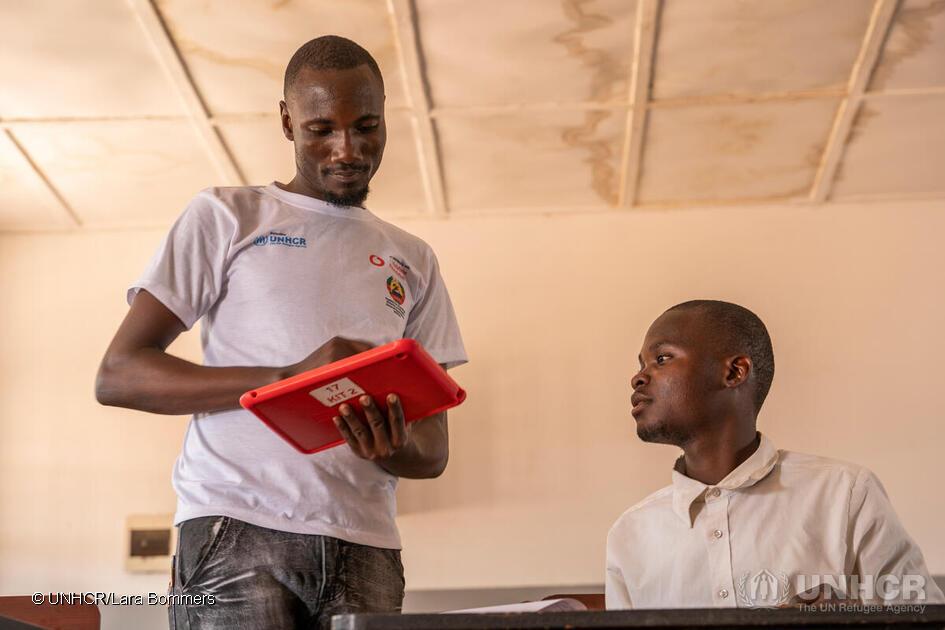
UNEP official: Every dollar invested in reviving degraded lands brings up to $30 in returns
Elizabeth Maruma Mrema, Deputy Executive Director of the United Nations Environment Program (UNEP), said every ...

Vodafone and the United Nations High Commissioner for Refugees (UNHCR) will partner this year to launch another 22 INS schools in Egypt and four new schools in Mozambique within the framework of commitment to the United Nations Sustainable Development (SDG 4) on quality education, said Joakim Reiter, Chief External and Corporate Affairs Officer, Vodafone Group and Trustee, Vodafone Foundation.
The new INS facilities in Egypt and Mozambique will help an estimated 52,000 more young people a year in those countries to gain a digital education.
The theme of this year’s UNESCO’s International Day of Education, which took place on January 24, is learning for lasting peace. There is no group that applies better to than the world’s refugees.
In a world that is rapidly digitizing, this group is particularly marginalized, without the resources, technology and skills to thrive in digital economies. That is why Vodafone Foundation is part of UNHCR, the UN Refugee Agency’s Refugee Connected Education Challenge (RCEC).
The RCEC aims to ensure universal access to high-quality connected education for refugees by 2030, paralleling nationals.
“Ten years ago, UNHCR asked Vodafone Foundation to lean into this challenge and use its technology expertise to support refugee education. We had no idea at the time that the classroom in a box we created would develop into a portfolio of 93 Instant Network Schools (INS), across six African nations,” Reiter said.
“The past decade has not been completely without challenge, and we have learned some important lessons that underscore the urgent need to generate more investment into refugee education,” he expounded.
“Firstly, digital should empower human interaction, rather than replacing it. Too many edtech development programs still focus on hardware and software donations. Training teachers and students to have the confidence to use digital technology as part of a rounded curriculum has been critical to the success of INS. A 2018 impact assessment on INS found that the program drove not just a 61% increase in digital literacy for students and 125% increase for teachers, but also improved attendance, academic performance and career aspirations. When I recently visited the El Mostakbal school in Cairo, pupils there told me that INS made education exciting, but I was struck by how important it was for the children to still be able to physically interact and play together,” he said.
“Secondly, investment in refugee education is also an investment in improving the educational infrastructure of low- and middle-income countries. As we see refugees being displaced for longer and longer periods of their lives, our focus has moved from providing resources in camps, to providing education for young people alongside children from local communities. Egypt, which has our largest deployment of INS, is a case in point. Some 46,000 children attend INS classrooms in public schools run by the Egyptian Ministry of Education,” he added.
“Thirdly, education is critically underfunded in countries that are hosting refugees. 76% of all refugees are hosted in low and middle-income countries (LMICs). Only an estimated 0.5% of global education spending is in less developed nations, and World Bank research indicates that education spending in low-income and LMICs is declining, in contrast to the trend in richer nations,” he said.
There is a reason why the fourth UN Sustainable Development Goal is to provide a quality education for all by 2030. Education is a critical lever for improved life chances. But to achieve that goal, more development finance must flow to helping the world’s forcibly displaced children to fulfill their potential.
Elizabeth Maruma Mrema, Deputy Executive Director of the United Nations Environment Program (UNEP), said every ...
President Abdel Fattah El Sisi issued eight directives on the Labor Day to ensure providing ...
Paysky, the leading digital payment solutions provider, was named among Forbes Top 50 Fintech companies ...


اترك تعليقا